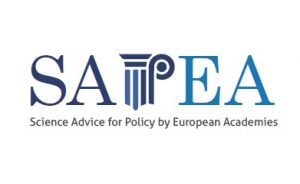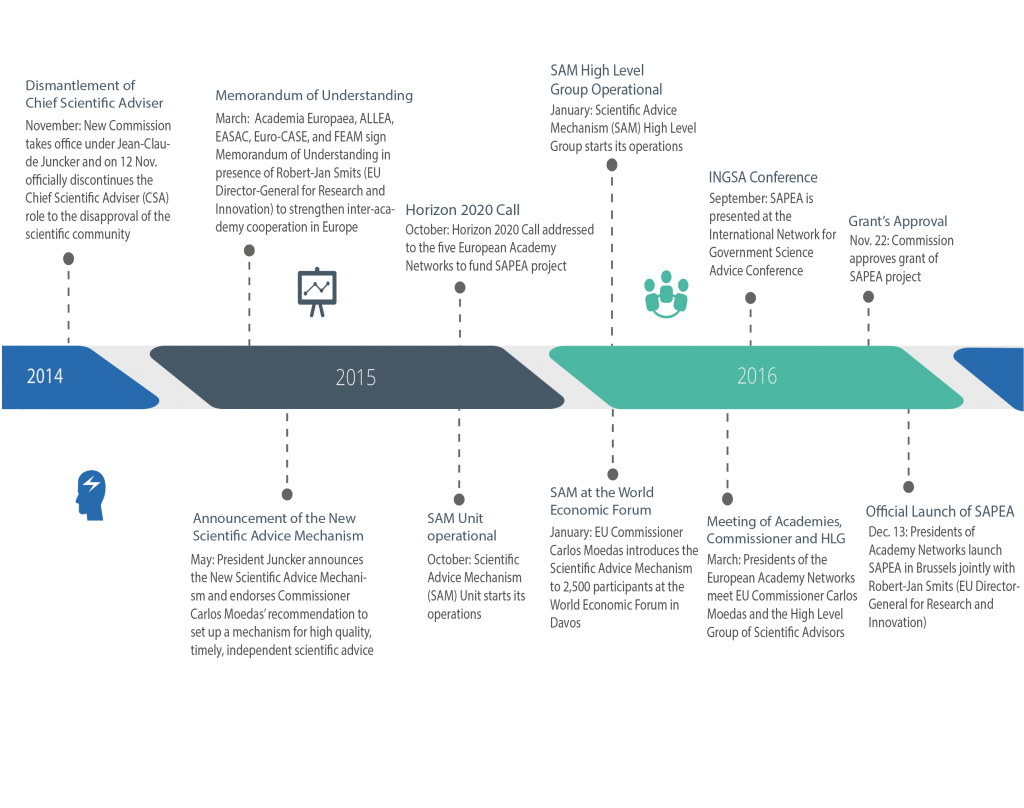 SAPEA (“Science Advice for Policy by European Academies”) works within the European Scientific Advice Mechanism (SAM) and is carried out by the five European academy networks (Academia Europaea, ALLEA, EASAC, Euro-CASE, and FEAM). The overall objective of the project is to pull together timely, independent and evidence-based scientific expertise from more than 100 European academies from over 40 countries for the highest policy level in Europe and for the wider public.
SAPEA (“Science Advice for Policy by European Academies”) works within the European Scientific Advice Mechanism (SAM) and is carried out by the five European academy networks (Academia Europaea, ALLEA, EASAC, Euro-CASE, and FEAM). The overall objective of the project is to pull together timely, independent and evidence-based scientific expertise from more than 100 European academies from over 40 countries for the highest policy level in Europe and for the wider public.
SAPEA was officially launched in Brussels on 13 December 2016 and has put in place its working structures concerning the management of science-based policy advice projects, administrative coordination, and communications. Its scientific activities are already in operation. The project will initially run for four years and in that time will receive € 6 Million in EU funding.
Background
Following the appointment of Jean-Claude Juncker as President of the European Commission, the nature of scientific advice to the Commission was fundamentally reimagined. Under the leadership of Commissioner for Research, Science and Innovation Carlos Moedas, the Scientific Advice Mechanism was created with the intention to provide a more diverse system of obtaining policy advice grounded in basic research.
To support this mechanism, the Commission issued a Horizon 2020 call in October 2015 with the purpose to coordinate scientific advice for policy making provided by the European networks of academies. In response, ALLEA together with four other European academy Networks formed a consortium and initiated the SAPEA project.
Academies have been longstanding providers of interdisciplinary expertise unparalleled in wealth and breadth by any other organisation in Europe. Actively bringing in the knowledge of academies into the policy-making process is thus only a logical development and highlights the importance of academies for the European science landscape.
The SAPEA project responds to the requirements laid out in the call and aims to improve the quality of EU policy making by providing timely scientific evidence to the European Commission’s Scientific Advice Mechanism, thereby increasing the transparency and ultimately public confidence in EU policy making. This will be achieved by creating effective links between individual academies and their wider European networks, thus strengthening their operational links with a view to further facilitate their joint cooperation with EU institutions.
Learn more on the building of SAPEA
How SAPEA Works
SAPEA works under the principles of independence and self-determination of the academies. Topic-wise, SAPEA’s activities will be derived both from bottom-up proposals made by the networks and top-down requests which the SAM High Level Group of Scientific Advisors (HLG) receives from the various Directorate-Generals in the European Commission. In the working process and based on scoping papers outlining the most relevant issues and research needs, SAPEA will work closely with the HLG to define how these topics can most appropriately be addressed within SAM.
SAPEA’s activities will be derived both from bottom-up proposals made by the networks and top-down requests which the SAM High Level Group of Scientific Advisors receives from the various Directorate-Generals .
To effectively assemble and consolidate scientific knowledge and evidence, SAPEA will set up interdisciplinary working groups with fellows from its academies across Europe which will function alongside the established working procedures of the participating networks. The distribution of scientific projects in SAPEA will be organised according to the most qualified network related to the topic.
Through the broad membership of fellows of more than 100 academies, SAPEA will reach out to the wider scientific community and, where needed, may involve the expertise and knowledge of outstanding external experts from other sectors of society. To this end, stakeholder hearings, workshops and expert interviews, among other activities, are envisaged. SAPEA’s outputs will take several formats, including scoping papers, evidence review reports, scientific statements, reports, and studies. Assuring the highest quality standards, all publications will be peer-reviewed and endorsed by the academy networks.
 The SAPEA project is part of the European Scientific Advice Mechanism and has received funding from the European Union’s Horizon 2020 research and innovation programme under grant agreement No 737432
The SAPEA project is part of the European Scientific Advice Mechanism and has received funding from the European Union’s Horizon 2020 research and innovation programme under grant agreement No 737432


